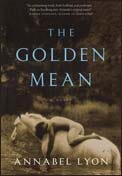What drove Aristotle to develop his theory of the Golden Mean? How could a man devoted to moderation and reason succeed as tutor to Alexander, the future conqueror of most of the known world?
Exploring these questions, Lyon's novel brings Aristotle to life as a man who yearns for love and acceptance but struggles with disappointment and a strange affliction that plunges him into fits of melancholy. "My father taught me long ago that black bile can be hot or cold. Cold: it makes you sluggish and stupid. Hot: it makes you brilliant, insatiable, frenzied. Like the different stages of drunkenness, you see? Only my father didn't realize that none of this had to be bad. The people who find the balance between the extremes--" Aristotle wields philosophy as valiantly, in his way, as Alexander later wields physical weapons when he rushes headlong into warfare.
The Aristotle who narrates The Golden Mean does not want or intend to be a teacher. But his fascination with everything odd, mysterious and difficult seems to tempt him ever deeper into the project Philip of Macedon sets for him. First, he helps Alexander's mentally damaged elder brother: "The smell is thick, an animal musk. . . . Despite the mask of foolishness, I can see the king his father in him . . ." Then it is Alexander, gifted with intelligence, ambition, glamour in abundance--but also damaged. Philip's heir, he must be made into a king.
The writing is brisk, hearty, wistful, casually shocking and thoughtful by turns, as it suits the story. Scholars of history may object to Aristotle's presence at one of Alexander's early battles, but the episode serves a deeper truth. Reminiscent of the best of Mary Renault and Rosemary Sutcliff in its easy familiarity with the ancient world, The Golden Mean whisks the pedestals out from under two towering historical figures, showing us their true greatness in rendering them human. (2009; 284 pages, including and Afterword and Acknowledgements separating history from fiction and listing major historical works consulted)




